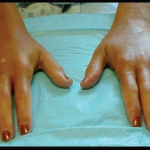The result, says Dr. Thompson, is tighter control of inflammatory arthritis. “We’ve found that by instituting protocols that [the practitioners] stick to, we’ve been able to move the management of patients forward.” There’s also that “magic bit of time,” he says, while practitioners are measuring disease activity and reviewing blood tests when they can listen to patients’ narratives. They often discover psychosocial factors that influence the progression of patients’ conditions. For example, he says, a patient may come in having a disease flare. During a conversation with the nurse consultant, the patient may reveal that the family dog just died, creating psychological distress and a lowered pain threshold. That is a patient who may not need to be treated with steroids if their distress level can be addressed with comfort measures and compassion from the nursing staff, he notes.
Timeline
1985 – Becomes staff nurse at East Reach Hospital, Taunton
1985 – Earns RGN from Somerset School of Nursing
1986 – Becomes staff nurse at ITU/CCU Musgrove Park Hospital, Taunton
1987 – Completes orthopaedic and trauma specialist course at Bristol and Weston School of Nursing
1988 – Joins the Trauma Unit at Poole Hospital
1989 – Becomes a Sister/Lieutenant in Queen Alexandra’s Royal Navy Nursing Service
1990 – Completes teaching and assessing specialist course at Plymouth School of Nursing
1995 – Receives diploma in management from the College of Further Education Plymouth
1999 – Completes rheumatology specialist course at Oxford Brookes University
2001 – Receives a Nurse Practitioner BSc from Bournemouth University
Judicious use of steroids dovetails with the unit’s concept of tight control in inflammatory arthritis, say Dr. Thompson and Cornell. The sooner patients’ medication concerns, disease flares, and other questions are addressed, the better their outcomes. Between visits, patients can call the Telephone Advice Line and receive prompt answers to their concerns. Selwyn C.M. Richards, MD, MSc, MA, BM BCh, who is the clinical lead for the rheumatology and back pain service at Poole Hospital, notes that Cornell “re-audited that [Telephone Advice Line], showing that we’re resolving a lot of questions about medications and seeing patients quickly for disease flares. So it gives the patients access to us, whereas otherwise they’d be seeing their primary care physicians who have much less experience in the field. We’re saving the primary care workload through the help line, and we’re really improving compliance by making patients feel confident that we’re monitoring their care.”


